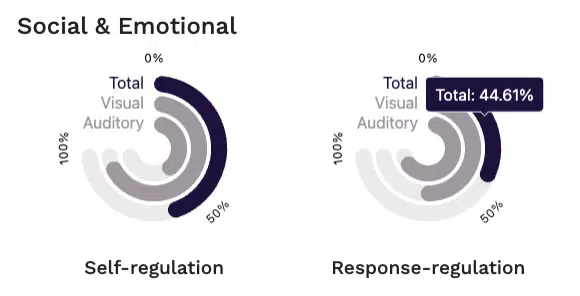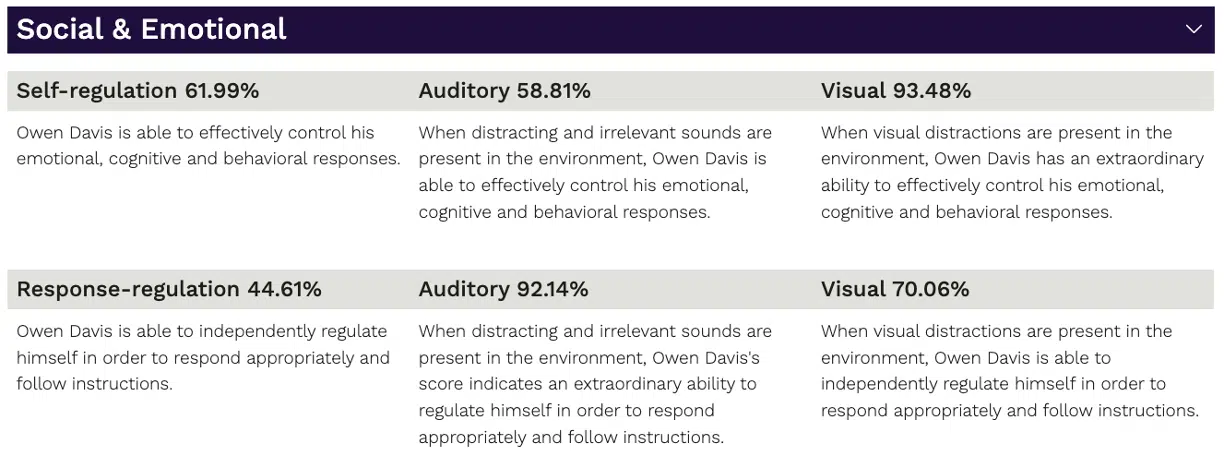This article explores how MOXO Profiler can help each and every learner enhance academic performance by highlighting critical data on his/her self regulation.
Research has long shown that executive functioning plays a pivotal role in academic performance, serving as the command center for managing cognitive tasks and behavioral responses (Cortés Pascual et al., 2019). One such executive function, self-regulation, stands at the forefront in predicting academic success (Robson et al., 2020). The MOXO Profiler provides easy to understand accessible measures of self-regulatory abilities through Self-Regulation and Response Regulation metrics. These measures provide educators with essential information that can aid in predicting the likelihood of each learner’s success, as well as pinpointing specific areas for which support is needed. These data points provide actionable information that educators and school professionals can use to more efficiently create specifically tailored intervention plans that offer support based on the learners’ individual needs.

Self-regulation and Academic performance
Self-regulation represents one’s ability to exercise control over their behaviors, thoughts, emotions and responses, allowing them to respond appropriately and in line with societal norms and in pursuit of long-term goals (Vohs & Baumeister, 2011). In educational settings, self-regulation enables learners to persist through challenges, delay gratification, and maintain focus amidst distractions, all of which are critical for success in a structured educational setting. Several research studies and meta-analyses have shown that self-regulation is among the most influential predictors of academic performance throughout development (Pintrich & De Groot, 1990; Pandey et al., 2017). Additionally, self-regulatory abilities in children can predict academic success in the future (Robson et al., 2020), providing important information that can aid in early intervention for those at risk for academic difficulties.

The connection between self-regulation and academic success is particularly evident in the way it bolsters student motivation. Research indicates that motivation moderates the relationship between self-regulation and academic performance (Ning & Downing, 2010). It may be that self-regulated learners are more likely to develop intrinsic motivation, where the drive to learn comes from within, rather than relying on external rewards or pressures leading to deeper engagement with learning materials. Thus, self-regulation not only prepares students to handle the academic demands of their studies but also instills a motivational framework that propels them towards achieving educational excellence.
Taken together, it is clear that self-regulation is essential for academic success, as it enables students to manage their emotions, behaviors, and cognitive processes effectively, allowing them effectively to learn, persist, and achieve educational goals. The MOXO Profiler’s ability to accurately measure self-regulation therefore offers significant benefits to educational professionals, providing them with critical insights into students’ learning processes.The MOXO Profiler can help identify students who may need additional support in developing their self-regulatory capacities, allowing for targeted interventions that can improve academic outcomes. Ultimately, by assessing and fostering self-regulation, educators can enhance not only individual student performance but also the overall educational environment.
Want to learn more about MOXO Profiler? Sign up for our next training session!
References
Cortés Pascual, A., Moyano Muñoz, N., & Quílez Robres, A. (2019). The relationship between executive functions and academic performance in primary education: Review and meta-analysis. Frontiers in Psychology, 10. https://doi.org/10.3389/fpsyg.2019.01582
Ning, H. K., & Downing, K. (2010). The reciprocal relationship between motivation and self-regulation: A longitudinal study on academic performance. Learning and Individual Differences, 20(6), 682–686. https://doi.org/10.1016/j.lindif.2010.09.010
Pandey, A., Hale, D., Das, S., Goddings, A.-L., Blakemore, S.-J., & Viner, R. (2017). Effectiveness of universal self-regulation-based interventions to improve self-regulation, and effects on distant health and social outcomes in children and adolescents: A systematic review and meta-analysis. The Lancet, 390, S66. https://doi.org/10.1016/s0140-6736(17)33001-5
Pintrich, P. R., & De Groot, E. V. (1990). Motivational and self-regulated learning components of classroom academic performance. Journal of Educational Psychology, 82(1), 33–40. https://doi.org/10.1037/0022-0663.82.1.33
Robson, D. A., Allen, M. S., & Howard, S. J. (2020). Self-regulation in childhood as a predictor of future outcomes: A meta-analytic review. Psychological Bulletin, 146(4), 324–354. https://doi.org/10.1037/bul0000227
Vohs, K. D., & Baumeister, R. F. (2011). Handbook of Self-Regulation, second edition: Research, theory, and applications. Guilford Press.


